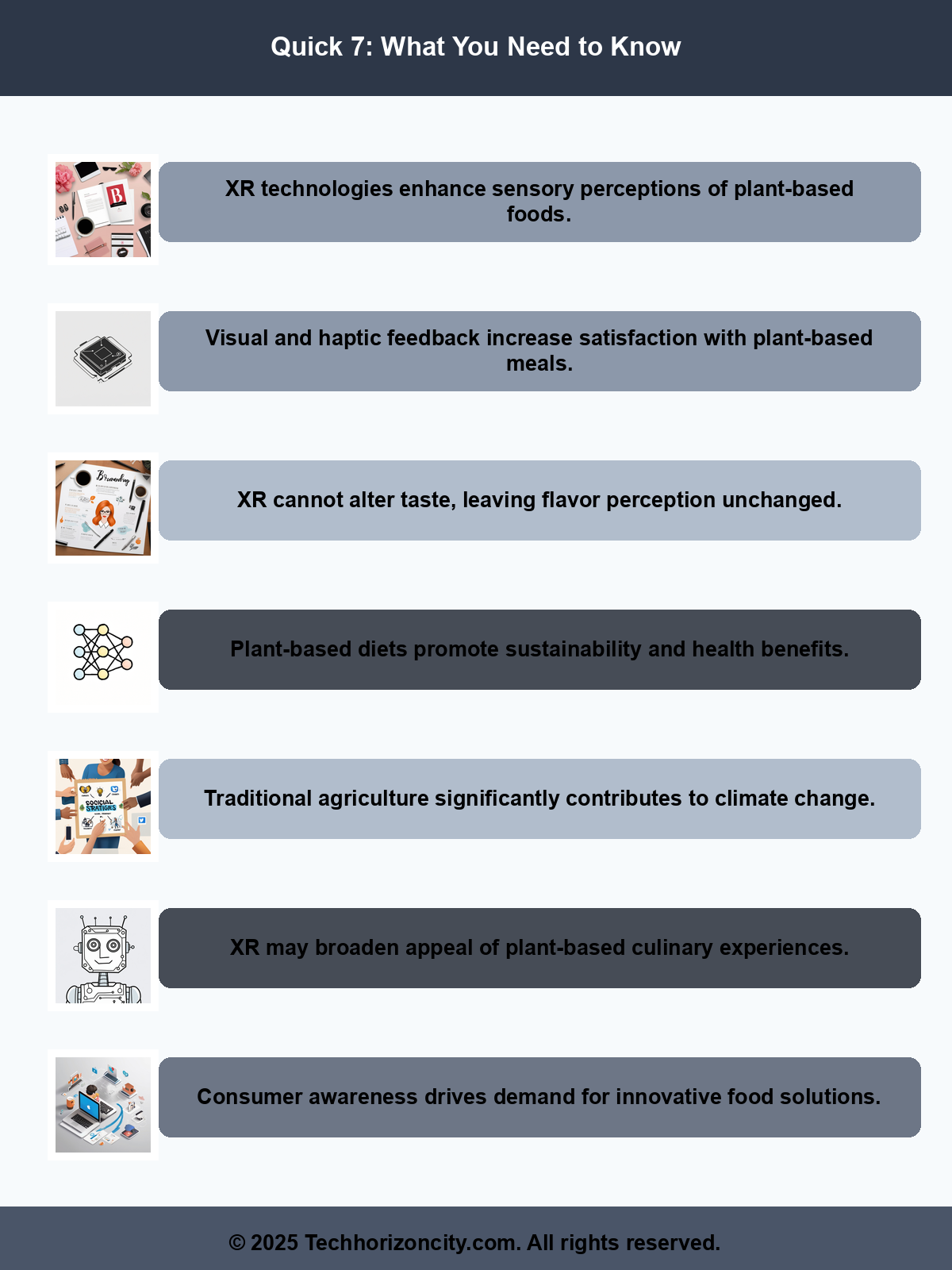Executive Summary
The evolution of food consumption is taking a fascinating turn as extended reality (XR) technologies, encompassing virtual reality (VR), augmented reality (AR), and mixed reality (MR), begin to influence our dining experiences. As the shift towards plant-based diets gains momentum for both health and environmental reasons, the application of XR could revolutionize the way we perceive and enjoy these foods. A recent study by researchers at Tampere University and VTT Technical Research Centre of Finland, led by Professor Roope Raisamo, explored how XR can enhance sensory perceptions of food, specifically contrasting traditional meatballs with their plant-based counterparts. The findings suggest that while XR can manipulate visual and tactile experiences, it leaves scent and taste largely unchanged, opening a dialogue about the potential and limitations of technology in food enjoyment.

Background Context
The agricultural industry is facing increasing scrutiny due to its extensive environmental footprint. From extensive land use to high water consumption and energy demands, traditional farming practices have been major contributors to climate change and pollution. A growing body of research advocates for a shift towards plant-based diets as a sustainable solution for both human health and ecological preservation. As consumers become more conscious of their dietary choices, the food industry must adapt to meet these evolving expectations.
In a unique study aimed at addressing the appeal of plant-based meals, researchers investigated the sensory perceptions of participants when tasting traditional versus plant-based meatballs. Utilizing XR technologies, they aimed to enhance the overall eating experience by augmenting key sensory inputs. In this innovative approach, the researchers hoped to make plant-based options more appealing to a broader audience, potentially facilitating dietary changes that align with sustainability goals.
Analysis of Implications
The findings from the Tampere University study reveal both exciting possibilities and inherent limitations of XR in enhancing culinary experiences. The introduction of visual and haptic feedback made food feel heavier and more substantial, potentially increasing diners’ satisfaction. This suggests that XR could offer a viable pathway to alter perceptions and experiences tied to food, making plant-based options more enticing. However, the fact that scent enhancements did not significantly elevate the appeal of the food raises questions about the limitations of XR technology in replicating the full spectrum of sensory experience.
Moreover, the unchanged taste of the food, regardless of the XR enhancements, prompts a critical analysis of how we approach flavor in the context of plant-based diets. While visual and tactile enhancements can create a more immersive dining experience, taste remains the ultimate arbiter of food enjoyment. This disparity highlights a crucial challenge: can XR technologies bridge the gap between perception and reality when it comes to flavor, or will they merely serve as a temporary distraction from the fundamental characteristics that define our culinary experiences?
Industry Impact Assessment
The integration of XR in the food industry is indicative of broader trends toward technological innovation across various sectors. As restaurants and food brands increasingly seek to differentiate themselves in a saturated market, XR offers a unique value proposition. Establishments could leverage these technologies to create memorable dining experiences that emphasize sustainability without compromising satisfaction.
However, the implementation of XR is not without its challenges. The costs associated with developing and maintaining such technology can be prohibitive, particularly for smaller businesses. Furthermore, consumer readiness to embrace XR in food contexts may vary, necessitating strategic marketing approaches to educate and entice customers. The psychological effects of XR experiences in dining will also need to be studied further, as they might influence long-term dietary habits.
Future Outlook
As we look to the future, the potential for XR to reshape our relationship with food is both exciting and complex. The food industry is on the verge of a technological revolution that could fundamentally alter how we experience meals. Imagine dining experiences where XR technologies can not only enhance the visual appeal of a plant-based dish but also interactively educate diners about its origins and environmental benefits.
We may also see the emergence of hybrid dining models where traditional culinary skills are combined with technological enhancements to produce novel experiences. As XR becomes more sophisticated, future iterations may succeed in addressing the current sensory limitations, creating a more holistic approach to food enjoyment that not only satisfies the eyes and hands but also tantalizes the taste buds.
Conclusion with Key Takeaways
The intersection of XR and plant-based diets offers a tantalizing glimpse into the future of food consumption. While studies like the one conducted by Professor Raisamo provide valuable insights into the possibilities offered by these technologies, they also highlight the challenges that must be navigated. Key takeaways include:
- XR can enhance the visual and tactile aspects of dining, making plant-based meals more appealing.
- However, taste and scent remain critical components that XR has yet to fully address.
- The food industry must balance technological innovation with the core qualities that define culinary satisfaction.
- Looking ahead, the integration of XR could revolutionize dining experiences, particularly as consumers seek sustainable options.
As we continue to explore the potential of XR in the culinary realm, the challenge lies in harnessing technology to not only enhance our experience but also to foster a sustainable future for food.
Disclaimer: This article was independently created based on publicly available information and industry analysis. While inspired by developments reported at www.thebrighterside.news, all content, analysis, and opinions expressed are original and do not reproduce copyrighted material.
For the original reporting, please visit: https://www.thebrighterside.news/post/scientists-make-plant-based-foods-more-appealing-using-extended-reality/
